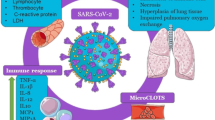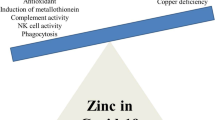Abstract
In COVID-19 infection, a balance must be achieved in immune defence against the virus without precipitating a cytokine storm, which is responsible for lung injury and respiratory distress in severe cases. The initial immune response and the subsequent resolution of inflammation are likely to be dependent on nutritional status, as one contributing factor. Here, we have reviewed the potential link between two specific nutrients, coenzyme Q10 (CoQ10) and selenium, with effects on oxidative stress and inflammation in viral infection. We conclude that both reagents show promise in the treatment of patients with COVID-19 disease. This could give particular relevance over the next several months as promising vaccines are deployed to minimise the COVID-19 spread and as a potential preventative or mitigating approach for future epidemics and pandemics.
Access this chapter
Tax calculation will be finalised at checkout
Purchases are for personal use only
Similar content being viewed by others
References
Koh TJ, DiPietro LA (2011) Inflammation and wound healing: the role of the macrophage. Expert Rev Mol Med 13:e23. https://doi.org/10.1017/S1462399411001943
Serhan CN, Dalli J, Colas RA, Winkler JW, Chiang N (2015) Protectins and maresins: new pro-resolving families of mediators in acute inflammation and resolution bioactive metabolome. Biochim Biophys Acta 1851(4):397–413
Hu B, Huang S, Yin L (2020) The cytokine storm and COVID-19. J Med Virol. Jun 27. https://doi.org/10.1002/jmv.26232. Online ahead of print
Crane FL (2001) Biochemical functions of CoQ10. J Am Coll Nutr 20(6):591–598
Hargreaves IP (2003) Ubiquinone: cholesterol’s reclusive cousin. Ann Clin Biochem 40(Pt 3):207–218
Rodick TC, Seibels DR, Babu JR, Huggins KW, Mathews ST (2018) Potential role of CoQ10 in health and disease. Nutr Diet Suppl 10:1–11
Schmelzer C, Lindner I, Rimbach G, Niklowitz P, Menke T, Döring F (2008) Functions of CoQ10 in inflammation and gene expression. Biofactors 32(1–4):179–183
Heaton RA, Heales S, Rahman K, Sexton DW, Hargreaves I (2020) The effect of cellular coenzyme Q(10) deficiency on lysosomal acidification. J Clin Med 2020 Jun 9(6):1923. https://doi.org/10.3390/jcm9061923
Weber C, Bysted A, Hłlmer G (1997) The coenzyme Q10 content of the average Danish diet. Int J Vitam Nutr Res 67(2):123–129
Kalén A, Appelkvist EL, Dallner G (1989) Age-related changes in the lipid compositions of rat and human tissues. Lipids 24(7):579–584
Hargreaves IP, Duncan AJ, Heales SJ, Land JM (2005) The effect of HMG-CoA reductase inhibitors on coenzyme Q10: possible biochemical/clinical implications. Drug Saf 28(8):659–676
Becker K, Tanzi P, Kalil A, Shibata D, Cain K (2013) Early statin use is associated with increased risk of infection after stroke. J Stroke Cerebrovasc Dis 22(1):66–71
Greenhalgh T, Koh G, Choon H, Car J (2020) Covid-19: a remote assessment in primary care. BMJ 368:m1182. https://doi.org/10.1136/bmj.m1182
Ghosh S, Dellibovi-Ragheb TA, Kerviel A, Pak E, Qiu Q, Fisher M et al (2020) β-Coronaviruses use lysosomes for egress instead of the biosynthetic secretory pathway. Cell S0092-8674(20)31446-X. https://doi.org/10.1016/j.cell.2020.10.039. Online ahead of print
Huang Z, Rose AH, Hoffmann PR (2012) The role of selenium in inflammation and immunity: from molecular mechanisms to therapeutic opportunities. Antioxid Redox Signal 16(7):705–743
Fogarty H, Townsend L, Ni Cheallaigh C, Bergin C, Martin-Loeches I, Browne P et al (2020) COVID-19 Coagulopathy in caucasian patients. Br J Haematol 189(6):1044–1049
Hargreaves IP, Mantle D (2019) Supplementation with selenium and coenzyme Q10 in critically ill patients. Br J Hosp Med (London, England) 80(10):589–593
Guillin OM, Vindry C, Ohlmann T, Chavatte L (2019) Selenium, selenoproteins and viral infection. Nutrients 11(9):2101. https://doi.org/10.3390/nu11092101
Conte P, Ronconi G, Caraffa A, Gallenga C, Ross R, Frydas I et al (2020) Induction of pro-inflammatory cytokines (IL-1 and IL-6) and ling inflammation by COVID-19 or SARS-COV-2: anti-inflammatory strategies. J Biol Regul Homeost Agents 34(2):327–331
Chen Y, Liu W, Sun T, Huang Y, Wang Y, Deb DK et al (2013) 1,25-Dihydroxyvitamin D promotes negative feedback regulation of TLR signaling via targeting microRNA-155-SOCS1 in macrophages. J Immunol 190(7):3687–3695
Poltajainen A, Matikainena S, Nymanb T, Aleniusa H, Veckman V (2013) Beta-glucan inducible microRNAs negatively regulate inflammatory response. Cytokines 63:290. https://doi.org/10.1016/j.cyto.2013.06.202
Crowe FL, Jolly K, MacArthur C, Manaseki-Holland S, Gittoes N, Hewison M et al (2019) Trends in the incidence of testing for vitamin D deficiency in primary care in the UK. BMJ Open 9(6):e028355. https://doi.org/10.1136/bmjopen-2018-028355
Grant WB, Lahore H, McDonnell SL, Baggerly CA, French CB, Aliano JL et al (2020) Evidence that vitamin D supplementation could reduce risk of influenza and COVID-19 infection and deaths. Nutrients 12(4):988. https://doi.org/10.3390/nu12040988
Dancer RC, Parekh D, Lax S, D’Souza V, Zheng S, Bassford CR et al (2015) Vitamin D deficiency contributes directly to Acute Respiratory Distress Syndrome (ARDS). Thorax 70(7):617–624
Chase M, Cocchi MN, Liu X, Andersen LW, Holmberg MJ, Donnino MW (2019) Coenzyme Q10 in acute influenza. Influenza Other Respir Viruses 13(1):64–70
Kelekci S, Sen V, Yolbas I, Uluca U, Tan I, Gurkan M (2012) The relationships between clinical outcome and the levels of total antioxidant capacity and CoQ10 in children with pandemic influenza (H1N1) and seasonal flu. Eur Rev Med Pharmacol Sci 16(8):1033–1038
Farazi A, Sofian M, Jabbariasl M, Nayebzadeh B (2014) Coenzyme Q10 administration in community-acquired pneumonia in the elderly. Iran Red Crescent Med J 16(12):e18852. https://doi.org/10.5812/ircmj.18852.
Israel A, Schaffer A, Cicurel A, Feldhamer I, Tal A, Cheng K, Sinha et al (2020) Large population study identifies drugs associated with reduced COVID 19 severity. medRxiv. https://doi.org/10.1101/2020.10.13.20211953
Moreno Fernández-Ayala DJ, Navas P, López-Lluch G (2020) Age-related mitochondrial dysfunction as a key factor in COVID-19 disease. Exp Gerontol. Nov 7;142:111147. https://doi.org/10.1016/j.exger.2020.111147. Online ahead of print
Gvozdjakova A, Klauco F, Kucharska J, Sumbalova Z (2020) Is mitochondrial bioenergetics and coenzyme Q10 the target of a virus causing COVID-19? Bratisl Lek Listy 121(11):775–778
Caruso F, Rossi M, Pedersen JZ, Incerpi S (2020) Computational studies reveal mechanism by which quinone derivatives can inhibit SARS-CoV-2. Study of embelin and two therapeutic compounds of interest, methyl prednisolone and dexamethasone. J Infect Public Health. Oct 14; S1876-0341(20)30671-7. https://doi.org/10.1016/j.jiph.2020.09.015. Online ahead of print
Mahmoodpoor A et al (2018) The effect of intravenous selenium on oxidative stress in critically ill patients with acute respiratory distress syndrome. Immunol Investig 48(2):147–159
Zhang J, Taylor EW, Bennett K, Saad R, Rayman MP (2020) Association between regional selenium status and reported outcome of COVID 19 cases in China. Am J Clin Nutr 111(6):1297–1299
Alehagen U, Johansson P, Björnstedt M, Rosén A, Dahlström U (2013) Cardiovascular mortality and N-terminal-proBNP reduced after combined selenium and coenzyme Q10 supplementation: a 5-year prospective randomized double-blind placebo-controlled trial among elderly Swedish citizens. Int J Cardiol 167(5):1860–1866
Alehagen U, Lindahl TL, Aaseth J, Svensson E, Johansson P (2015) Levels of sP-selectin and hs-CRP decrease with dietary intervention with selenium and coenzyme Q10 combined: a secondary analysis of a randomized clinical trial. PLoS One 10(9):e0137680. https://doi.org/10.1371/journal.pone.0137680
López-Lluch G, Del Pozo-Cruz J, Sánchez-Cuesta A, Cortés-Rodríguez AB, Navas P (2019) Bioavailability of coenzyme Q10 supplements depends on carrier lipids and solubilization. Nutrition 57:133–140
Author information
Authors and Affiliations
Corresponding author
Editor information
Editors and Affiliations
Rights and permissions
Copyright information
© 2021 The Author(s), under exclusive license to Springer Nature Switzerland AG
About this chapter
Cite this chapter
Hargreaves, I.R., Mantle, D. (2021). COVID-19, Coenzyme Q10 and Selenium. In: Guest, P.C. (eds) Identification of Biomarkers, New Treatments, and Vaccines for COVID-19. Advances in Experimental Medicine and Biology(), vol 1327. Springer, Cham. https://doi.org/10.1007/978-3-030-71697-4_13
Download citation
DOI: https://doi.org/10.1007/978-3-030-71697-4_13
Published:
Publisher Name: Springer, Cham
Print ISBN: 978-3-030-71696-7
Online ISBN: 978-3-030-71697-4
eBook Packages: Biomedical and Life SciencesBiomedical and Life Sciences (R0)




